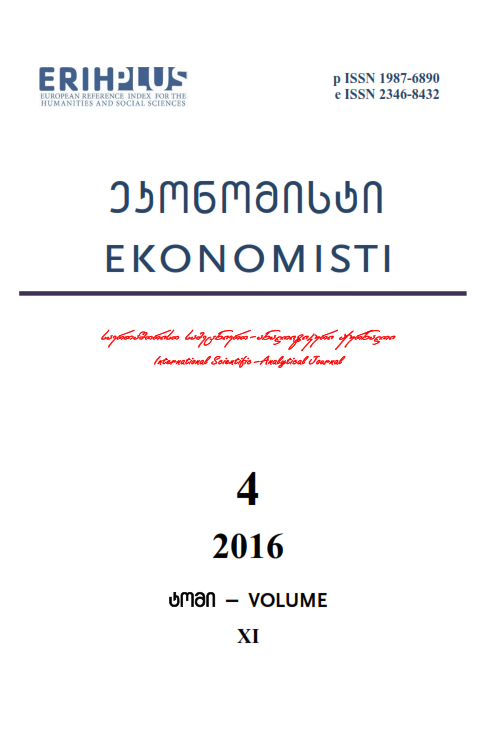
The international scientific and analytical, reviewed, printing and electronic journal of Paata Gugushvili Institute of Economics of Ivane Javakhishvili Tbilisi State University

Poverty Problem in the Neoclassical Economic Theory
Expanded Summary
Modern society faces multitude of social, economic, political, and other problems. One of the most critical of those ones is poverty. Poverty is a problem that have not any historical or territorial boundaries. Poverty is an issue affecting every country and the global economy. Poverty was and still remains to be a common interest in societies worldwide.
Why are people poor and why they cannot escape poverty? What causes poverty? What are the consequences of poverty for individuals, families and society as a whole? Who is responsible for poverty? How realistic is the fight against poverty and how we can overcome poverty? Representatives of various scientific fields, including economists, try to answer these and many other poverty-related questions.
Based on the own methodological framework different economic schools develop an own understanding of causes and consequences of poverty and have a significant contribution in the development of the economic theory of poverty.
Given paper investigates the problem of poverty in the neoclassical economic school and provides a brief overlooking of some the best known viewpoints of the prominent representatives of neoclassical political economy (William Stanley Jevons, Alfred Marshall, Irving Fisher, and Arthur Cecil Pigou). The scientific interest of the neoclassicists is directed on the investigation of the economic wellbeing predominantly and poverty is considered as an actual fact that might obstacles to economic wealth and development.
Based on the studied viewpoints, the different approaches to poverty could be distinguished. Building on the classical tradition, neoclassical theory considers the poverty issues proceeding from its material component or from the possibility to meet the material needs of man. Such position treats poverty mainly as an economic phenomenon which is related to unequal access to the economic resources. The idea of lack of sufficient income and its direct liaising to poverty dominate in economic explanations of poverty existence.
The neoclassical theory is based on the assumption about natural origin of poverty and develops a capability approach toward the poverty understanding. Within the framework of natural origin of poverty neoclassicists stress the inequality of personal characteristics of people, weak capabilities of individuals, differences in their abilities, education, etc. which determine their productivity and therefore income. From another hand, some representatives of neoclassical economics (for instance, see W. Jevons, A. Marshall and etc.) in framework of the natural origin of poverty among others causes mention a fast growth of population as a root of poverty. But unlike T. R. Malthus, they consider the effect of population growth on the labour supply and labour equilibrium price and therefore on the income and poverty. Consequently, the conclusion from such approach is that poorer are ultimately responsible for their poverty.
No one of those approaches pay attention to class analysis of poverty.
Neoclassical school of economics widely discusses the policy of redistribution of the income from rich individuals to poor through tax policy and charitable action and the problem of reasonable spending of poor’s income takes an important part in this discussion. The neoclassical economists continue to provide the laissez faire policies and alike to their predecessors feel that government intervention to alleviate poverty only rewards the negative behavior of the poor and should be discontinued.
